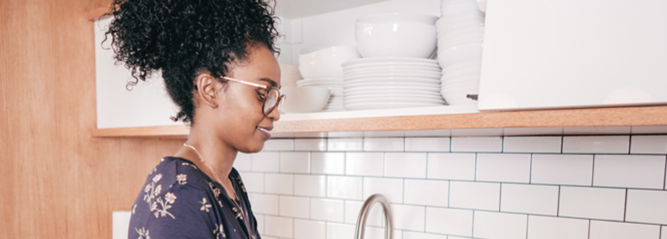3 mins
How to organise your home for diabetes management
Practicing healthy habits and setting up your environment for success are two ways that you can make your diabetes self-care even better.
3 mins
Practicing healthy habits and setting up your environment for success are two ways that you can make your diabetes self-care even better.

Table of contents
We tend to think people who do something well do so because they are highly motivated and/or have lots of willpower. But that is not necessarily true. An environment that supports the actions you want to take can make a positive difference; whilst willpower is great, it is a finite resource that will run out.
Think about it this way. Keeping your toothbrush in the bathroom makes brushing your teeth much easier than if you kept your toothbrush in your garage, right? That is an example of setting up your home to support the healthy habit of brushing your teeth regularly.
Setting up your home and work environments to support your desired actions helps you take those actions more easily. Regular repetition of these actions become habits, and habits require little thought or effort.
Let’s look at some ways you can turn your home into a place that supports healthier behaviours.
Because healthy eating is a cornerstone to being healthy with diabetes, the foods in your kitchen can significantly determine your health. It is much easier to reach for a healthy snack or prepare a healthy meal when you have healthy foods in your cupboards and fridge.
Swapping processed foods like crisps or canned fruit in syrup, for whole foods such as vegetables, fruit, nuts, seeds, eggs, milk, cheese, plain Greek yogurt and lean meats, can help you make healthier food choices.
By reducing the amount of processed foods kept in the house, you will likely eat them less often.
Tip: People often choose what they eat not because of what it is but how near it is. Replace sweets that you keep in sight - like muffins on your kitchen counter - with a bowl of fruit. Soon you will find you are eating more fruit than muffins.
Lay out your workout clothes before you go to bed, and put them where you will see them first thing in the morning. Visual cues are powerful. It’s much easier to do something when you have a visual reminder in front of you, and harder to do it when you don’t.
Hang a calendar in an easily accessible place, and mark the days when you have scheduled doctor’s appointments and need to reorder your prescription medicines and medical supplies.
Looking around your home, think how else you can make a few changes that will support your diabetes tasks. For example, keeping your medications in your kitchen so you see them first thing when making a drink.
An environment set up for success will also support healthy habits. Habits are shortcuts; they allow us to do things automatically without a lot of energy and decision-making.
Many people with diabetes say that the healthy habits they practice are what makes them so successful in their management.
People tend to think you need a lot of discipline to manage diabetes well, but healthy habits help people be disciplined. So, rather than wish you were more disciplined, begin initiating habits that will make you so. Here are some healthy habits you could try to make it easier to manage your diabetes:
Setting up your home for success and practicing healthy habits are two powerful ways to make you more successful managing your diabetes. What ways do you set yourself up for success in managing diabetes?
This content is provided for general information only. It is not intended to amount to advice on which you should rely – you must obtain professional or specialist advice from your healthcare professional before taking, or refraining from, any action on the basis of the content. Although we make reasonable efforts to ensure that the content is up to date, Roche makes no representations, warranties or guarantees, whether expressed or implied, that the content is accurate, complete, up-to-date or that it should be relied upon.